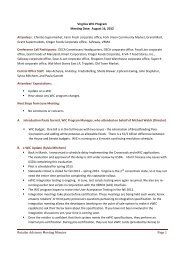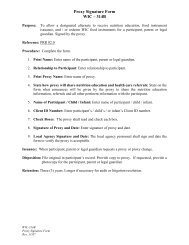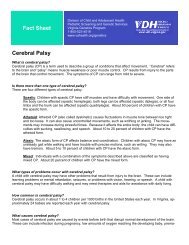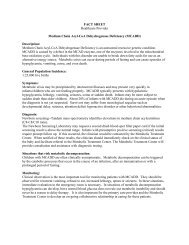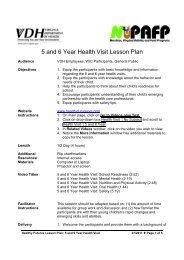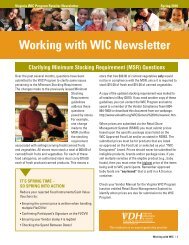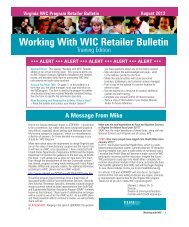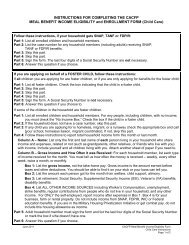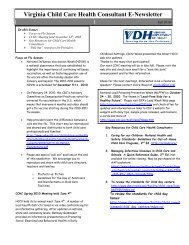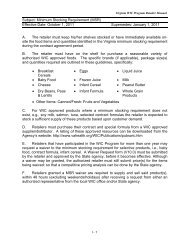WIC EBT Feasibility Study and Cost‐Benefit Analysis
WIC EBT Feasibility Study and Cost‐Benefit Analysis
WIC EBT Feasibility Study and Cost‐Benefit Analysis
You also want an ePaper? Increase the reach of your titles
YUMPU automatically turns print PDFs into web optimized ePapers that Google loves.
Virginia Department of Health <strong>WIC</strong> <strong>EBT</strong> <strong>Feasibility</strong> <strong>Study</strong> <strong>and</strong> Cost-Benefit <strong>Analysis</strong><br />
<strong>and</strong> food type <strong>and</strong> dates these benefits are available. Virginia has indicated that their <strong>WIC</strong><br />
clinics will require terminals with this functionality.<br />
The e-<strong>WIC</strong> contractor provides the State with the required quantities of e-<strong>WIC</strong> cards. Contractor<br />
fees include the card graphics design, card production <strong>and</strong> card delivery. The contractor<br />
calculates card stock needs based on caseloads, card loss <strong>and</strong> client turnover rates. Contractors<br />
do not produce the cards themselves; this service is contracted to card production firms that meet<br />
ISO 9000 st<strong>and</strong>ards at facilities that meet the security requirements of credit <strong>and</strong> debit card<br />
issuers.<br />
The e-<strong>WIC</strong> contractor is also responsible for providing help desk services to staff, retailers <strong>and</strong><br />
clients. Client help desk support is a significant cost driver for <strong>EBT</strong> contractors; States often<br />
take measures to reduce their <strong>EBT</strong> cost per case month (CPCM) pricing by providing a greater<br />
level of training to clients, counseling clients identified as frequent users, <strong>and</strong> requiring the <strong>EBT</strong><br />
contractor to provide clients with web-based access to account information. North Carolina has<br />
elected to move Food Stamp <strong>EBT</strong> client help desk services in-house to reduce the CPCM fee<br />
charged by their <strong>EBT</strong> Contractor. By law, some States require on-shore or even in-state<br />
customer service centers, which generates a higher CPCM.<br />
The contract with an e-<strong>WIC</strong> service provider usually contains performance st<strong>and</strong>ards concerning<br />
system uptime; transaction response times; retailer equipment installation <strong>and</strong> repair times; help<br />
desk response times; <strong>and</strong> more. States enforce these st<strong>and</strong>ards by initiating payment hold-backs<br />
<strong>and</strong>/or liquidated damages when st<strong>and</strong>ards are not met.<br />
4.1.1.1 The Clients’ Perspective<br />
From the clients’ perspective the difference between on-line<br />
outsourced <strong>and</strong> in-house e-<strong>WIC</strong> should be transparent. In the online<br />
environment the head of household is issued a magnetic stripe<br />
card at the local office <strong>and</strong> selects a PIN. All of the household’s<br />
benefits may be accessed with one card – unlike the paper-based<br />
system, where separate vouchers, <strong>and</strong> sometimes multiple vouchers,<br />
are issued to each <strong>WIC</strong> participant in a household. With on-line e-<br />
<strong>WIC</strong>, cards may be issued to additional household members, as<br />
transactions are recorded at the host system in real time <strong>and</strong> there is little risk of a household<br />
redeeming the same benefits twice.<br />
The card <strong>and</strong> PIN serve as the client’s identification at the POS. Because each item of the<br />
purchase must be approved by the host system, the card is swiped prior to beginning a purchase<br />
transaction. Generally, the client’s account, an itemized list of authorized food items, is then<br />
downloaded by the host to the POS. Non-<strong>WIC</strong> items, items that are not part of a household’s<br />
benefits, <strong>and</strong> expired benefits will not be approved for purchase. Upon completion of the<br />
transaction, the client is provided with a receipt that indicates items purchased as well as the<br />
benefits remaining in the household’s account. The POS immediately uploads the transaction<br />
data back to the host system.<br />
When the client returns to the <strong>WIC</strong> clinic for services <strong>and</strong> is authorized for additional benefits,<br />
the benefits are uploaded (either real time or through overnight batch processing) to the host<br />
13 V 1.2 August 20, 2008



